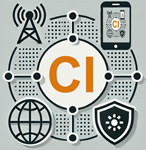2024 PdD | Syllabus
General training 1-4
Worldview and socio-cultural foundations of scientific and technical activity
Ukrainian as a foreign language
Presentation of Scientific Results
Pedagogy and psychology of higher education with teaching methods
Professional Training 1-2
Markov models of infocommunication networks
Software and technologies for networks modeling
2023 Bachelors and Masters | Syllabus
- Digital Signal Processing
- Frequency-Selective Devices of Radio Telecommunication Systems
- Computer networks administration
- Computer and telecommunication networks
- Basics of cisco industrial certification
- Global computer networks
- Technologies of transport networks
- Electromagnetic compabtibility
- Multiservice technology
- Scientific basics research
- System software of telecommunication systems
- Design and administration of computer networks
- Switching systems in telecommunications
- Information systems and databases
- Electromagnetic compabtibility
- ===
- Computers and Microprocessors
- Applications coding for 3D topology
- Theory of information and encoding
- Artificial intelligence methods of image synthesis
- Destributed systems and knowlege bases
- Fiber Optic Equipment of Telecommunication Systems
- Infocommunication networks and technologies (pdf)
- Infocommunication networks and technologies (zip)
- Information Protection in Telecommunication Systems
- Quality of service in information communication networks (pdf)
- Quality of service in information communication networks (zip)
- Recognition-systems-for-augmented-reality
- Spatial intelligence in infocommunication
- Transmission Systems in Telecommunications
2020
Complexes of educational and methodological support of disciplines
of the curriculum of 2020 training
in the specialty 123 “Computer Engineering”
(Bachelor)
Complexes of educational and methodological support of disciplines
of the curriculum of 2020 training
in the specialty 172 “Telecommunications and Radio Engineering”
(Bachelor)
2023
Complexes of educational and methodological support of disciplines
of the curriculum of 2023 training
in the specialty 172 “Electronic communications and radio engineering”
(masters)
